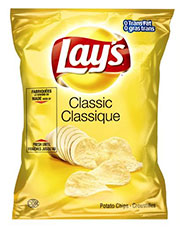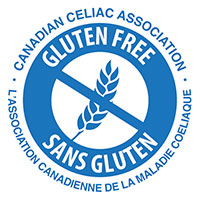Gluten Free Certification Program
By Tina Brillinger
Last month, several incidents made national headlines, driving home the hidden dangers in the food supply and the harmful effects of gluten on persons with celiac disease and gluten sensitivity.
One came out of Utah, Arizona. A federal lawsuit has been brought against a local politician who, according to the claimant, Tim Lawson, delayed funding that would have established regulations for gluten-free thresholds and labelling in the U.S.
“We have a life-threatening autoimmune illness that affects (more than) nine million people (in the U.S.), but legislators could care less,” Lawson, who is dying from complications of celiac disease, told The Salt Lake Tribune.
Celiac disease is a serious and potentially fatal condition where the surface of the small intestine that absorbs nutrients from food is damaged by harmful gluten, which is found in wheat, rye, barley, oats and triticale.
Canada, on the other hand, should take pride in the fact that it recently enhanced its food labelling regulations. As of Aug. 4, food manufacturers must disclose gluten sources in pre-packaged foods and better clarify the definition of “gluten-free.” The main differences between the existing and new regulations are the disclosure requirements regarding gluten sources and that harmful protein components are the focus of the new definition of “gluten.”
Coinciding with the timing of these labelling amendments, Health Canada has released an interpretative guidance document on gluten-free claims. In this document, Health Canada states that gluten-free foods prepared under good manufacturing practices, which contain levels of gluten not exceeding 20 parts per million (ppm) as a result of cross-contamination, must meet the health and safety intent of section B.24.018 of the Food and Drug Regulation when a gluten-free claim is made.
To further assist consumers in easily identifying safe foods that are free from gluten, the Canadian Celiac Association (CCA) developed the Gluten-Free Certification Program (GFCP). The GFCP is a voluntary program for food manufacturers, which incorporates these new regulatory requirements as part of the overall program to satisfy the growing consumer demand for a greater variety of trusted products.
“The CCA has invested a lot in bringing the program to market to meet the needs of the more than three million Canadians who are challenged by gluten,” says the association’s outgoing Executive Director, Jim McCarthy. “A gluten-free diet is the only treatment.”
Frank Massong, Director of Regulatory and Government Affairs at Paul Valder Consulting Inc., adds, “Celiacs and people with gluten sensitivity have a special need that can only be satisfied by a gluten-free diet, which is hard to achieve even with the new regulations. The GFCP will make these products more reliable, accessible, identifiable and affordable as companies take their gluten-free products mainstream.”
How?
 Through the use of a credible certification “mark,” which, when applied to consumer packaging of gluten-free products, signifies the product has been produced by a manufacturer that has met the rigorous requirements of the GFCP. Meeting these requirements demonstrates the manufacturer’s ability to consistently produce a safe gluten-free product.
Through the use of a credible certification “mark,” which, when applied to consumer packaging of gluten-free products, signifies the product has been produced by a manufacturer that has met the rigorous requirements of the GFCP. Meeting these requirements demonstrates the manufacturer’s ability to consistently produce a safe gluten-free product.
There are several steps a company must take to become certified.
First, a manufacturer that wishes to use the GFCP mark on its product packaging and marketing materials must apply to the program and enter into a mandatory Program License Agreement (PLA).
Once the facility has implemented its gluten-free management system, it must contact an approved third-party auditing company that can provide a GFCP trained auditor to conduct an on-site audit to verify delivery and the effectiveness of the system.
To successfully pass the audit, a manufacturing facility must have a gluten-free management system in place, which may be integrated into its existing food safety management system. This system must be designed to reduce the risk of gluten contamination and ensure the food safety outcome is not greater than 20 ppm. It must also include a written commitment from senior management to meet the terms and conditions of the program. As well, an appropriate Hazard Analysis and Critical Control Point (HACCP) based program must be in place and products must meet Health Canada’s gluten-free regulations and the Canadian Food Inspection Agency’s “truth in labelling” provisions.
In order to comply with the PLA and continue to use the GFCP mark, an annual audit must be conducted to confirm that the manufacturer is continually complying with the requirements of the program.
“What makes this program unique and very strong is that it has a regulatory foundation, combined with globally recognized HACCP principles, to effectively control food safety hazards like gluten. As well, it’s endorsed by the CCA,” says Paul Valder, a food safety consultant and President of the Allergen Control Group (ACG), which administers the GFCP program on behalf of the CCA.
According to Valder, several companies are currently actively pursuing certification.
“We also have well over 100 inquiries for certification from companies and major retailers that would like the mark on their private label brands,” he says.
Earlier this month, PepsiCo Canada became the first company to have products certified under the program. The GFCP issued certificates of recognition to the four facilities in Canada and one in Mexico for meeting its requirements. This makes Lay’s brand potato chips Canada’s first officially GFCP certified gluten-free food.
“This is just the first of a number of certified products consumers will see in grocery stores over the coming months,” says Valder.
To have more articles like this emailed to your inbox, become a GFSR Member today!

-
 FeaturedRisk management
The Cost of a Breach: What a Cyberattack Could Mean for Food Safety Recalls
FeaturedRisk management
The Cost of a Breach: What a Cyberattack Could Mean for Food Safety Recalls
-
 FeaturedRisk management
Securing the Food Chain: How ISO/IEC 27001 Strengthens Cybersecurity
FeaturedRisk management
Securing the Food Chain: How ISO/IEC 27001 Strengthens Cybersecurity
-
 FeaturedRisk management
Revolutionizing Food Safety Training: Breaking Out of the “Check-the-Box” Mentality
FeaturedRisk management
Revolutionizing Food Safety Training: Breaking Out of the “Check-the-Box” Mentality
-
 GFSI Standards
GFSI 2025: Building Trust, Tech-Forward Solutions, and Global Unity in Food Safety
GFSI Standards
GFSI 2025: Building Trust, Tech-Forward Solutions, and Global Unity in Food Safety
-
 FeaturedFood Safety
Integrated Pest Management: Strategies to Protect Your Brand’s Reputation
FeaturedFood Safety
Integrated Pest Management: Strategies to Protect Your Brand’s Reputation
-
 FeaturedFood Safety Culture & Training
No Open Door Policy: Challenges That Impact Pest Control in Food Processing Plants
FeaturedFood Safety Culture & Training
No Open Door Policy: Challenges That Impact Pest Control in Food Processing Plants



